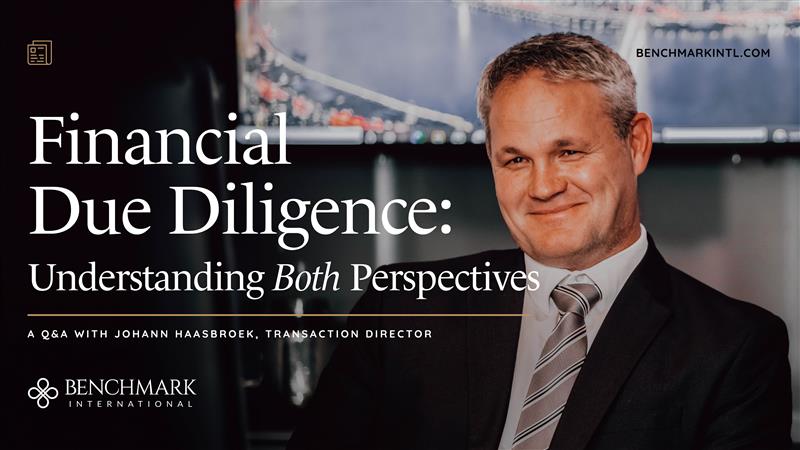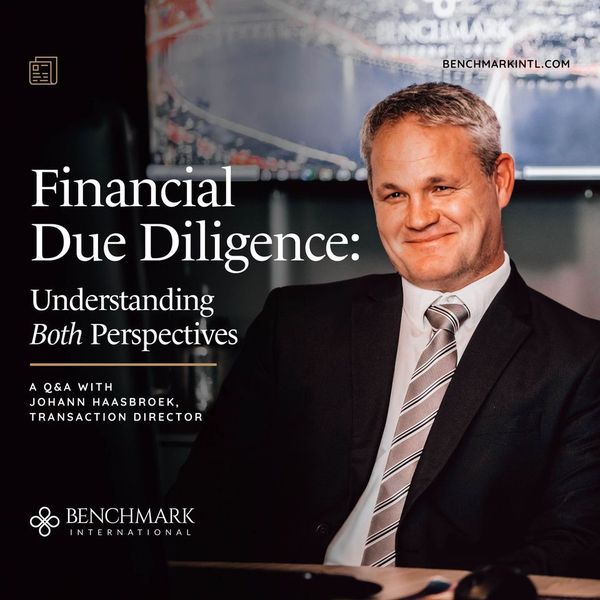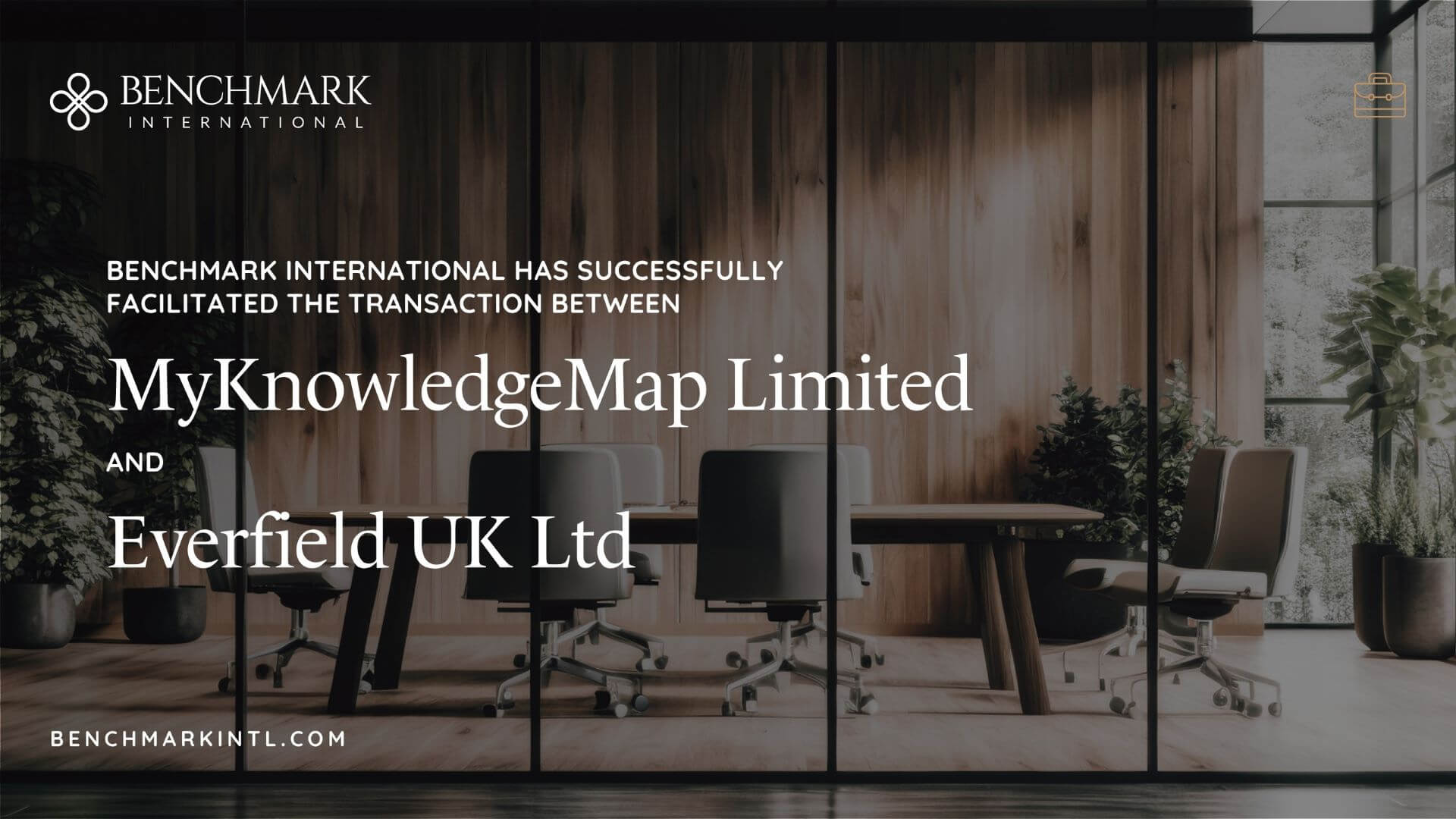
For buyers, the financial due diligence (FDD) exercise is a major fact-finding exercise that will, hopefully, reinforce the assumptions that have underpinned their offer. For sellers it’s an opportunity to showcase the business and to reinforce the opportunity to the buyer. For both, it’s a pivotal exercise for informed decision-making, providing protection from unexpected risks and uncertainties. Essentially, FDD allows both parties to complete a transaction with their eyes open.
Johann Haasbroek, Transaction director at Benchmark International South Africa, answers some of the key questions raised by seller clients.
Is FDD an Audit?
The FDD process is often perceived as akin to ‘another’ auditing procedure; however, the dynamics of FDD differ significantly as this is conducted by the buyer's due diligence team, as opposed to auditors familiar with the target company. Not only is the due diligence team unfamiliar with the target company's business, processes, and sector, but the scope of FDD varies based on factors such as the target company's size, complexity, and nature of business.
Regardless, the FDD team will conduct a deep dive into the company’s profitability and financial position, as they will need to highlight whether there are any risks that may have not been disclosed during the negotiation process. The approach will be more commercial and forward-looking than any audit. Key areas covered will include recent trading and prospects (with a focus on sales and margin maintenance and growth prospects) cost structures, key customers, quality of net assets, levels of ‘normalized’ working capital and trends, and a range of taxation matters.
When evaluating potential investment, financial investors are also increasingly prioritizing ESG factors, which cover environmental (carbon footprint or resource management), social (like labour practices), and governance aspects (such as board structure). These factors can influence future profitability, brand reputation, and risk management, thereby having an impact on a company's financial performance over the short and long term.
View our Vendor Due Diligence Guide for a detailed list.
What is Desktop FDD?
‘Desktop FDD’ (also known as a ‘preliminary’) involves a high-level analysis conducted by the buyer's team in the early stages of engagement. Basic information such as audited accounts, management accounts and forecasts are typically requested as part of the desktop FDD. This process is often used to initiate negotiations, offering an initial overview, and helps formulate preliminary perceptions regarding value, opportunities, and risks. This confirmatory FDD, when undertaken, should ensure misunderstandings and disagreements over the company’s financials are limited.
Will the FDD be a Distraction?
Key stakeholders involved in the FDD typically include representatives from both the buyer and seller, financial analysts, and potentially industry experts where there is some overlap with commercial due diligence (if this is being undertaken). Their collaborative efforts aim to scrutinize financial records, operational details, legal agreements, and other critical aspects of the target company.
Any sellers that are working full-time within the business will inevitably be involved in key discussions, as will senior members of the finance team, if required. In some instances, the buyer or their FDD team may request access to other team members, although the messaging around this and timing need to be carefully managed.
The duration of FDD varies significantly, sometimes lacking a fixed timeline due to the multitude of factors that influence the process each time. In the event the information requested is not readily available, it will require sellers to invest time in accurately preparing it in a presentable format. Insufficient internal support often hampers the preparation of information, causing delays and hindering the efficiency of the due diligence process.
What About Confidentiality?
Although a standard non-disclosure agreement (NDA) will have been put in place before releasing the Information Memorandum to the buyer, giving the business a high degree of carefully defined legal protection, the seller’s chosen lawyer may choose to implement a more detailed NDA before the FDD commences.
In practice, the FDD teams used by most buyers are very aware of seller clients’ confidentiality concerns and will normally tread very carefully, using modern technology (i.e. virtual data rooms and video conferencing) to perform FDD off-site. Any required site meetings can often be held out-of-hours.
See more on How Technology is Streamlining the Deal Process.
How can Sellers Prepare for the FDD?
Preparation for FDD is essential; not only does it demonstrate the seller’s commitment to transparency, it also minimizes delays and disruptions to day-to-day operations. Ensuring accuracy and clarity of financial related information is paramount for the FDD, as it allows sellers to build trust with the buyers and promote clear, honest dialogue throughout the rest of the process.
Understanding the buyer’s objectives and key focus areas empowers sellers to prepare comprehensively. The following tips are key for the preparation phase:
- Does the business hold any risk factors? If so, these need proactively addressing and disclosing to the advisory team. Part of their responsibility is to find solutions equitable to both parties.
- Historic financial statements should be audited and accepted by the company’s directors. Management accounts should be readily available and up to date. If sellers lack the expertise in doing financial forecasts, external consultants need to be considered.
- Sellers need to identify discrepancies to allow for a timely resolution and avoid potential concerns surfacing later.
- Sellers should consult external expertise (auditors or tax advisors) if financial or tax queries arise that exceed their team’s skills.
This preparatory phase is a delicate balancing act, as it necessitates providing buyers and their advisors with reliable, accurate information, which sometimes may surpass the capabilities of sellers. Remember, the FDD process is a collaborative, not adversarial, endeavor. It requires sellers to leverage the expertise of seasoned M&A professionals versed in navigating due diligence processes. Partnering with such experts unlocks valuable guidance, ultimately enhancing the seller's ability to yield optimal outcomes.
Do Sellers See a Copy of the FDD report?
The FDD report will likely contain a number of detailed sections covering the business, its earnings, and its financial position, but will also have what is often referred to as an ‘Executive Summary’, which will bring together key aspects and provide the buyer with high-level opinions concerning the business and the deal itself.
FDD providers are accustomed to sharing the detailed sections of the FDD report with the sellers and their advisers, to ensure the assumptions on which their report is based are sound. This provides the sellers full opportunity to challenge any findings that may be incorrect or misjudged.
The deal team will be particularly concerned with any matters that could affect the buyer’s assessment of earnings and any key adjustments, such as in relation to surplus assets (like free cash) and debt. The FDD team’s assessment of net working capital will be of particular interest.
Conclusion
FDD represents a crucial phase in the process, offering sellers the opportunity to bolster their positions. It allows them to showcase their business achievements and highlight potentially advantageous synergies. Simultaneously, buyers utilize this phase to pinpoint both weaknesses and opportunities, enabling them to envision themselves as potential future owners or partners. The insights gained during this phase can guide strategic decisions, fortify operational frameworks, and foster an environment conducive to future success.
Moreover, FDD serves as a platform for both parties to strengthen their relationship and build upon the trust established since their initial engagement. When conducted professionally, FDD sets the stage for subsequent negotiations and finalization of the legal agreements, efficiently bringing the sales process right through to the final phase.

Author
Johann Haasbroek
Transaction Director
Benchmark International
T: +27 (0) 11 070 0002
E: haasbroek@benchmarkintl.com
Europe: Michael Lawrie at +44 (0) 161 359 4400 / Lawrie@BenchmarkIntl.com
Americas: Sam Smoot at +1 (813) 898 2350 / Smoot@BenchmarkIntl.com
Africa: Anthony McCardle at +27 21 300 2055 / McCardle@BenchmarkIntl.com
ABOUT BENCHMARK INTERNATIONAL:
Benchmark International is a global M&A firm that provides business owners with creative, value-maximizing solutions for growing and exiting their businesses. Benchmark International has handled over $10 billion in transaction value across various industries from offices across the world. With decades of M&A experience, Benchmark International’s transaction teams have assisted business owners with achieving their objectives and ensuring the continued growth of their businesses. The firm has also been named the Investment Banking Firm of the Year by The M&A Advisor and the Global M&A Network as well as the #1 Sell-side Exclusive M&A Advisor in the World by Pitchbook’s Global League Tables.
 Benchmark International
Benchmark International  Benchmark International
Benchmark International 





